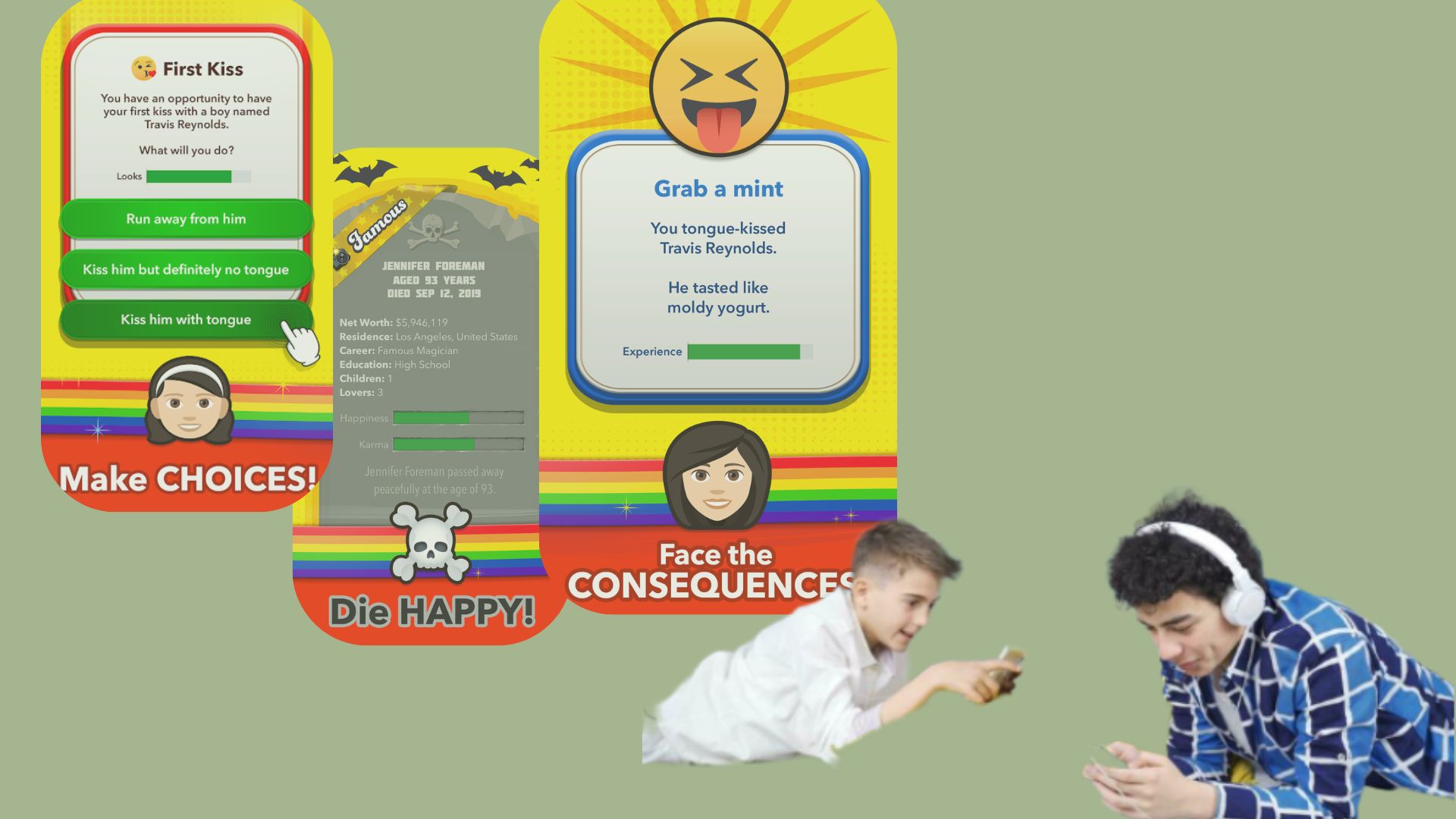ClevGuard Support: Monitor Devices with Others' Permission.

BitLife is a popular single-player life simulation game that invites users to live out an entire virtual existence—from birth to death—through a series of multiple-choice decisions. While its quirky gameplay and role-play scenarios attract many kids and teens, BitLife has also raised significant concerns among parents. Its adult themes, in-app purchases, and lack of content filters prompt an important question: Is BitLife safe for children and teenagers? This article explores how the app works, what risks it poses, and how families can manage its use responsibly.
Table of Contents
Part 1: What Is BitLife and How Does It Work?
Part 2: Why Is BitLife So Appealing to Kids?
Part 3: Is BitLife Safe for Kids?
Part 4: Age Requirements and In-App Purchases
Part 5: What Parents Should Be Concerned About
Part 6: Can BitLife Be Made Safer for Teens?
Part 7: Alternatives to BitLife
What Is BitLife and How Does It Work?
BitLife allows players to simulate major life decisions such as going to college, building careers, forming relationships, and even committing crimes. The player guides a virtual character from infancy to old age, shaping their experiences along the way.
Gameplay is entirely text-based, with minimal graphics and a reliance on written prompts and player choices. Players can explore various paths—from leading a quiet, successful life to making ethically questionable decisions. The app's design encourages repeat playthroughs with different choices and outcomes.
Despite its simple format, BitLife has amassed millions of downloads and continues to trend in app stores. Its popularity among younger users often surpasses the app's recommended age guidelines.
Why Is BitLife So Appealing to Kids?
One reason BitLife appeals to younger audiences is its open-ended structure. There's no set objective, which means players can explore various lifestyles and decisions at their own pace.
- Control over life decisions makes kids feel empowered. They're in charge of every detail, from education to personal relationships.
- The app promotes social sharing of in-game milestones, which can be fun for teens wanting to show off unique life scenarios.
- The simple user interface and easy-to-navigate text prompts make BitLife accessible even for younger players unfamiliar with complex gaming systems.
While these features add to the app's charm, they also mask some of the more concerning content embedded in gameplay.
Is BitLife Safe for Kids?
BitLife is rated 17+ on both iOS and Android platforms, but that hasn't stopped younger users from downloading it. Unfortunately, the game includes many adult themes, such as:
Sexual activity, drug use, and gambling
Criminal behavior like robbery or assault
Characters joining gangs or engaging in violent acts
The game also features frequent unskippable ads, many of which promote other adult-themed apps. There are no built-in content filters, meaning parents can't limit what their child sees or does in-game.
What's more, the game's mature tone is masked by its cartoonish simplicity, making it easier for kids to access inappropriate scenarios without fully grasping the consequences.

Age Requirements and In-App Purchases
BitLife's developer, Candywriter LLC, states that users should be 16 years or older, although the app stores designate it as suitable for 17+. Still, age verification is limited, and younger teens can easily bypass restrictions.
- Bitizenship – removes ads and unlocks exclusive features
- God Mode – allows edits to characters' traits and appearances
- Additional mini-expansions involving crime syndicates and darker themes
These options raise concerns about accidental in-app purchases, especially for younger users who may not fully understand what they're buying.
What Parents Should Be Concerned About
BitLife's open format and mature themes raise several red flags for families:
The app normalizes or trivializes unethical behavior, from lying to participating in organized crime.
There's little to no educational value, and its random, sensationalized events can mislead young users about real-life consequences.
Ads served within the app can lead users to even more explicit content.
In many ways, BitLife functions like a text-based role-playing game—but one that lacks the boundaries younger players need. For a look at how other seemingly innocent apps may hide risky content, check out our guide on how to spot fake calculator apps.
Can BitLife Be Made Safer for Teens?
While BitLife is not appropriate for young children, some older teens may be mature enough to navigate its content with guidance. Here's what parents can do:
Set an age threshold: Only allow access if your teen is 16 or older.
Use a parental control app to monitor app usage, limit screen time, and block new downloads. For tips on cross-platform monitoring, see our guide on how to track a child's Android phone from an iPhone.
Consider playing the game together or discussing outcomes to help teens think critically about their choices.
Establish a family media agreement that includes limits on mature content and rules for app purchases.
Foster open communication—talk about what your child is seeing and how it makes them feel.
To further support media literacy, consider exploring what it means to be "chronically online" and how this can affect mental well-being.
Alternatives to BitLife
If your child enjoys simulation games but you feel BitLife introduces too many mature or inappropriate themes, there are several alternatives that combine engaging gameplay with more age-appropriate content. These games can still satisfy a child’s curiosity about life management, choices, and creativity—without exposing them to adult-oriented scenarios.
1The Sims 4
This classic life simulator allows players to create and control characters in a virtual world. While some expansion packs include mature themes, the base game can be configured for a more family-friendly experience with adjustable content filters and parental guidance.
2Cities: Skylines
A highly regarded city-building simulation game that focuses on urban planning, budgeting, and infrastructure. It offers an educational look at civic systems and promotes strategic thinking and resource management.
3Animal Crossing
New Horizons: A gentle, community-centered game that encourages collaboration, customization, and emotional expression. With no violent or inappropriate content, it’s ideal for fostering creativity and social interaction in a safe digital environment.
These alternatives provide meaningful gameplay and developmental benefits while aligning more closely with the values many parents seek in digital entertainment for children and teens.
Conclsuion
BitLife may look harmless at first glance, but its gameplay often includes content that is inappropriate for children and even many teenagers. While it can be entertaining and thought-provoking for some older users, the risks—ranging from unfiltered scenarios to financial exposure—are too great for most younger players.
With tools like a trusted parental control tool, families can better monitor and guide app use, block unsafe content, and start more informed discussions about what's happening on screen.
In the end, parents know their child best. If BitLife isn't a good fit, there are plenty of other games that allow teens to explore, create, and grow—without the moral gray zones.

An Array of Amazing Features
- Track cell phone location in real time and view location history
- Check all incoming and outgoing calls & SMS
- Spy on social media apps like WhatsApp, Instagram, Snapchat, Facebook, Viber, WeChat and more
- Remotely access the files on the target phone, like contacts, photos, call logs, etc.
- Omegle for Kids: Why It Is Dangerous for Kids?
- Top 10 Safe Kid Games: Have Fun & Learn Now
- 10 Popular Teen Dating Apps: Parents Should Know
- What is Kik? Is It Safe for Teens?
- AI Learning for Kids: Tools & Resources for Parents
You may also be interested in:

By Annie Brooks
An experienced writer and blogger, very passionate about writing and curious about latest tech trends.
Thank you for your feedback!


